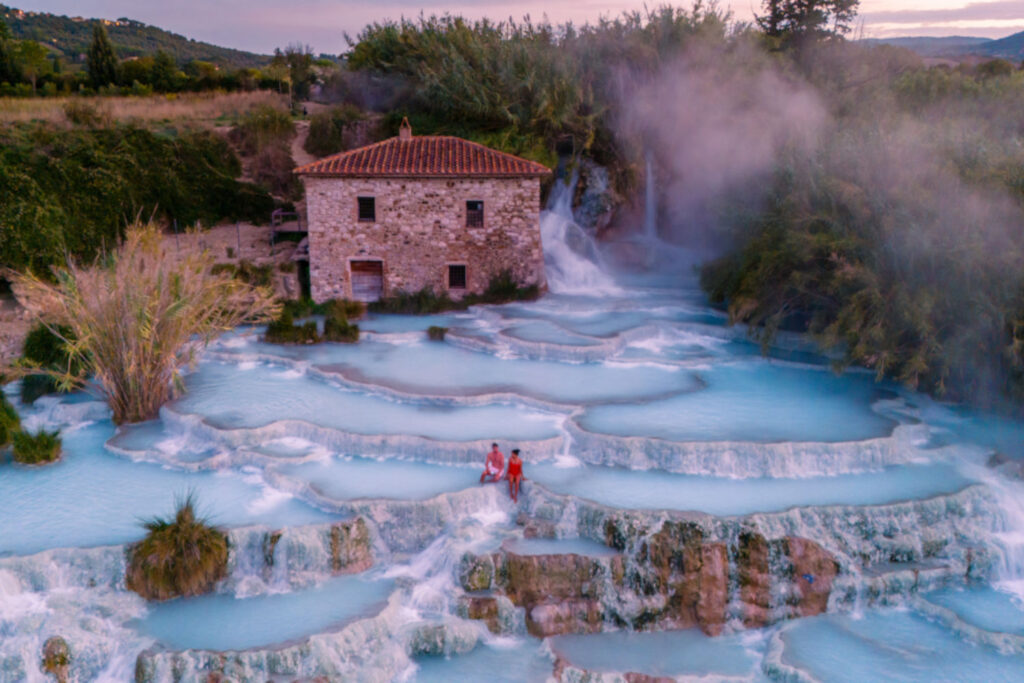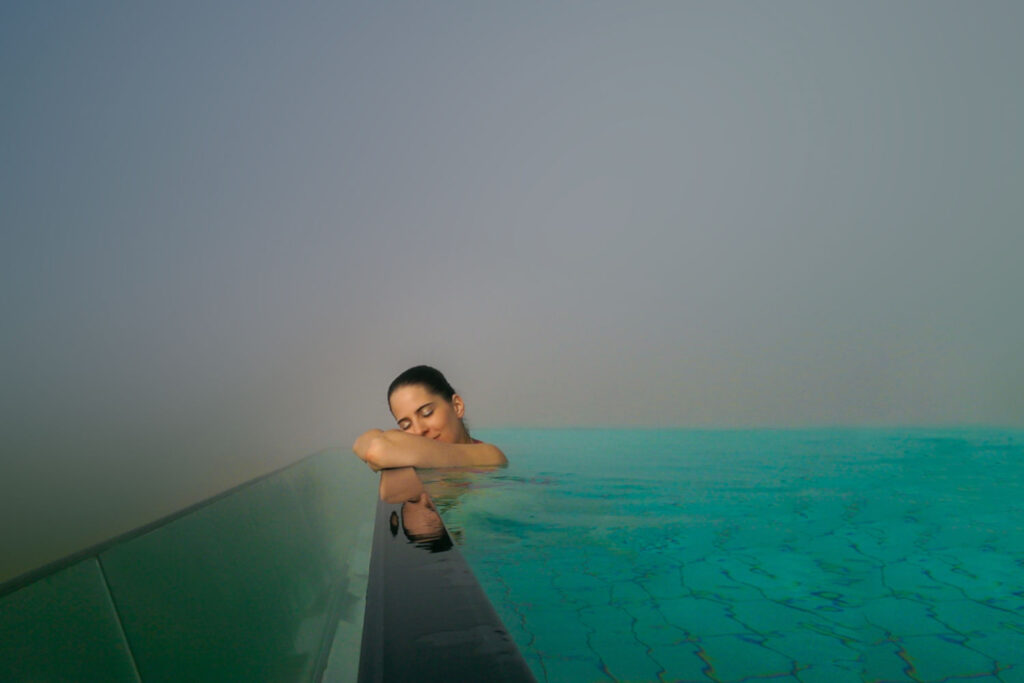When the warmth sinks deep into your tissues and your thoughts come to rest, the silent magic of thermal water begins. Anyone who thinks it is just water at a pleasant temperature is misjudging its effect on body and mind. The healing power of the earth nourishes cells, alleviates ailments and strengthens inner balance. Studies prove what cultures have always known intuitively. This is exactly where Mandira Ayurveda comes in – where thermal water becomes a source of genuine regeneration.
The most important facts in brief:
- Natural origin: Thermal water is created when rainwater seeps into the depths, heats up to at least 20 °C and is enriched with minerals.
- Scientifically proven: Studies show that a 25-minute thermal bath significantly lowers stress hormone levels and contributes to relaxation.
- Wide range of applications: In addition to classic bathing, thermal water can also be drunk or inhaled – depending on the symptoms and composition.
- Healing ingredients: The minerals it contains, such as calcium, magnesium and sulphur, have anti-inflammatory, pain-relieving and skin-regenerating effects.
- Holistic therapy: At the Ayurveda Resort Mandira, the power of thermal water is combined with traditional Ayurvedic treatments for lasting regeneration.
Contents
- What is thermal water?
- Composition and minerals
- Thermal water: effects on body and mind
- When you should be careful
- Forms of application: Bathing, drinking, inhalation
- Thermal water at the Ayurveda Resort Mandira
- Frequently asked questions
What is thermal water?
Thermal water is a natural water source whose temperature is at least 20 degrees Celsius when it emerges. It is created when rainwater penetrates deep into the earth and is naturally heated on its way through various layers of rock. Due to the extreme conditions, neither plants nor animals can survive in thermal water, which is why the springs are usually free of vegetation.
As it travels underground, the water is enriched with minerals and trace elements that give it its healing properties.
Did you already know?
The term “spa” is derived from the Latin “sanus per aquam”, which means “health through water” – a reference to the centuries-old tradition of spas.
Composition and minerals
The healing effect of thermal water is based on its unique composition. Depending on the place of origin, it contains different minerals and trace elements in high concentrations. These ingredients can be absorbed through the skin and thus develop their therapeutic effect.
All minerals have a different effect on the body:
- Calcium in thermal water strengthens bones and joints and contributes to skin regeneration.
- Magnesium-rich waters have a relaxing effect on muscles and nerves, ideal for stress and tension.
- Sulphur compounds alleviate skin problems and have an anti-inflammatory effect, particularly in the case of psoriasis and neurodermatitis.
- Sodium-containing springs regulate the fluid balance and support the detoxification of the body.
- Thermal waters containing iron promote the supply of oxygen and can be helpful in cases of exhaustion.
- Bicarbonate neutralizes acids and protects the skin from external influences.
Intensity for healing power from the depths: thermal water from Bad Waltersdorf
Thermal water from Bad Waltersdorf is one of the most effective healing springs in Styria. It springs from great depths and is particularly rich in natural minerals. The soothing warmth and balanced mix of minerals promote blood circulation, relax muscles and nerves and support regeneration in cases of exhaustion, joint complaints or after operations.
The soft water has a soothing effect, especially on skin problems such as eczema or neurodermatitis. It also unfolds its healing potential for rheumatic complaints, stress or sleep disorders.
Thermal water: effects on body and mind
The healing power of thermal water is confirmed both in traditional medicine and in modern scientific studies. Balneotherapy – the medical use of thermal water – combines traditional knowledge with current research. The holistic effect on physical and psychological aspects of health is particularly impressive.
Stress reduction
A bath in thermal water has been proven to reduce stress levels. A study has shown that bathing in thermal water can significantly reduce cortisol levels, which is particularly important for coping with stress. The soothing warmth of the water in combination with the dissolved minerals relaxes the muscles and calms the nervous system.
Research result
A study with 81 participants showed that the combination of exercise and a bath in thermal water led to a significant drop in systolic blood pressure and that stressed people felt less tired and more rested afterwards.
Relief for complaints
Thermal water has proven to be an effective support for numerous ailments. For rheumatic conditions such as arthritis, the anti-inflammatory and pain-relieving properties of the mineral-rich water can significantly improve symptoms.
Sulphur thermal water strengthens the body’s defense mechanisms against free radicals and lowers harmful LDL cholesterol levels – especially homocysteine, which is linked to heart attacks, strokes, depression and dementia.
For skin conditions such as psoriasis or neurodermatitis, thermal water can support the skin microbiome and reduce inflammation. The minerals it contains also have antioxidant properties that neutralize free radicals and promote skin regeneration.

When you should be careful
Thermal water is generally very well tolerated – however, there are some situations in which it is better to avoid bathing or to seek medical advice:
- for cardiovascular diseases (heat can put a strain on the circulation)
- for acute inflammation or febrile infections
- for open wounds (risk of infection)
- during pregnancy – especially with very hot baths
- for sensitive skin, if the water is particularly rich in minerals
- in the case of severe heart failure (exposure to heat and water pressure)
Forms of application: Bathing, drinking, inhalation
Thermal water can be used therapeutically in various ways. Each form of application offers specific benefits and can be selected according to individual needs and complaints. Classic balneotherapy comprises three main applications: Bathing, drinking and inhalation.
Bathing
Bathing in thermal water is the best known and most frequently used form of treatment. The minerals and trace elements are absorbed through the skin and can take effect throughout the entire body. The optimum bathing time is between 15 and 30 minutes, depending on the water temperature and individual well-being.
Thermal baths are particularly effective for joint complaints, muscle tension and skin problems. The combination of heat and minerals promotes blood circulation, relaxes the muscles and can relieve pain.

“As a Vata/Pitta type, warm water is my natural counterbalance. It calms my nervous system, relaxes my body and mind – especially after emotionally charged days. I can feel how the water gently absorbs me, how tension is released and how my inner balance slowly returns.”
Christina Drexler, Holistic Ayurveda Expert & Managing Director of the Ayurveda Resort Mandira
Drink
Drinking thermal water, also known as a drinking cure, is mainly used to treat digestive complaints and metabolic disorders. It should be noted that not all thermal water is suitable for drinking – only springs specifically designated as medicinal water should be used internally.
The minerals are absorbed via the gastrointestinal tract and can therefore have a direct effect on the metabolism. Drinking cures are often used for diabetes, digestive problems or for detoxification. The dosage should be adjusted individually and is ideally done after consultation with a doctor or therapist.
Inhale
Inhaling thermal water is particularly helpful for respiratory diseases such as asthma, bronchitis or allergies. Through inhalation, the valuable minerals reach the mucous membranes of the respiratory tract directly, where they can develop their anti-inflammatory and expectorant effect.
The fine droplets of water moisturize the mucous membranes and support the natural cleansing function of the respiratory tract. Thermal waters containing sulphur or salt have proven particularly effective for respiratory complaints. Many thermal baths offer special inhalation treatments that can further enhance the effect.
Thermal water at the Ayurveda Resort Mandira
At the Ayurveda Resort Mandira, we combine the healing power of Styrian thermal water with traditional Ayurvedic treatments. This unique combination creates synergies that deeply regenerate body and mind. Our holistic approach integrates the mineral-rich thermal springs into individual spa programs that are tailored to your personal needs.
Regeneration that goes deeper
Discover the healing combination of Ayurveda and thermal water – with a customized treatment at the Mandira Resort. Regenerate, deepen, and recharge now.
Frequently asked questions
What is the difference between thermal water and normal water?
Thermal water is distinguished by its higher temperature (at least 20 °C at the outlet) and its high content of minerals and trace elements. It originates at great depths and has a proven therapeutic effect on the skin, muscles and metabolism, whereas normal water does not have these health-promoting properties.
How often should thermal water treatments be carried out for therapeutic purposes?
For therapeutic purposes, 10 to 15 applications within two to three weeks are usually recommended. This intensive form of treatment can specifically alleviate complaints. For prevention or general regeneration, regular baths at intervals of one to two weeks are recommended, depending on your state of health and tolerance.
What side effects does thermal water have?
Possible side effects of thermal water include circulatory strain in the case of heart problems, skin irritation in the case of sensitive skin or the aggravation of acute inflammation. Feverish infections or open wounds are also exclusion criteria. If unsure, medical advice should be sought before use.
How long can you stay in the thermal water?
Ideally, a stay in thermal water should last between 15 and 30 minutes. Longer bathing times can put unnecessary strain on the circulation, especially at high temperatures. The individual condition and the temperature of the water determine the optimum duration. It is advisable to take breaks between several treatments.
Cover image: © Robert Faritsch – stock.adobe.com; Image 1: © Fokke Baarssen – stock.adobe.com



